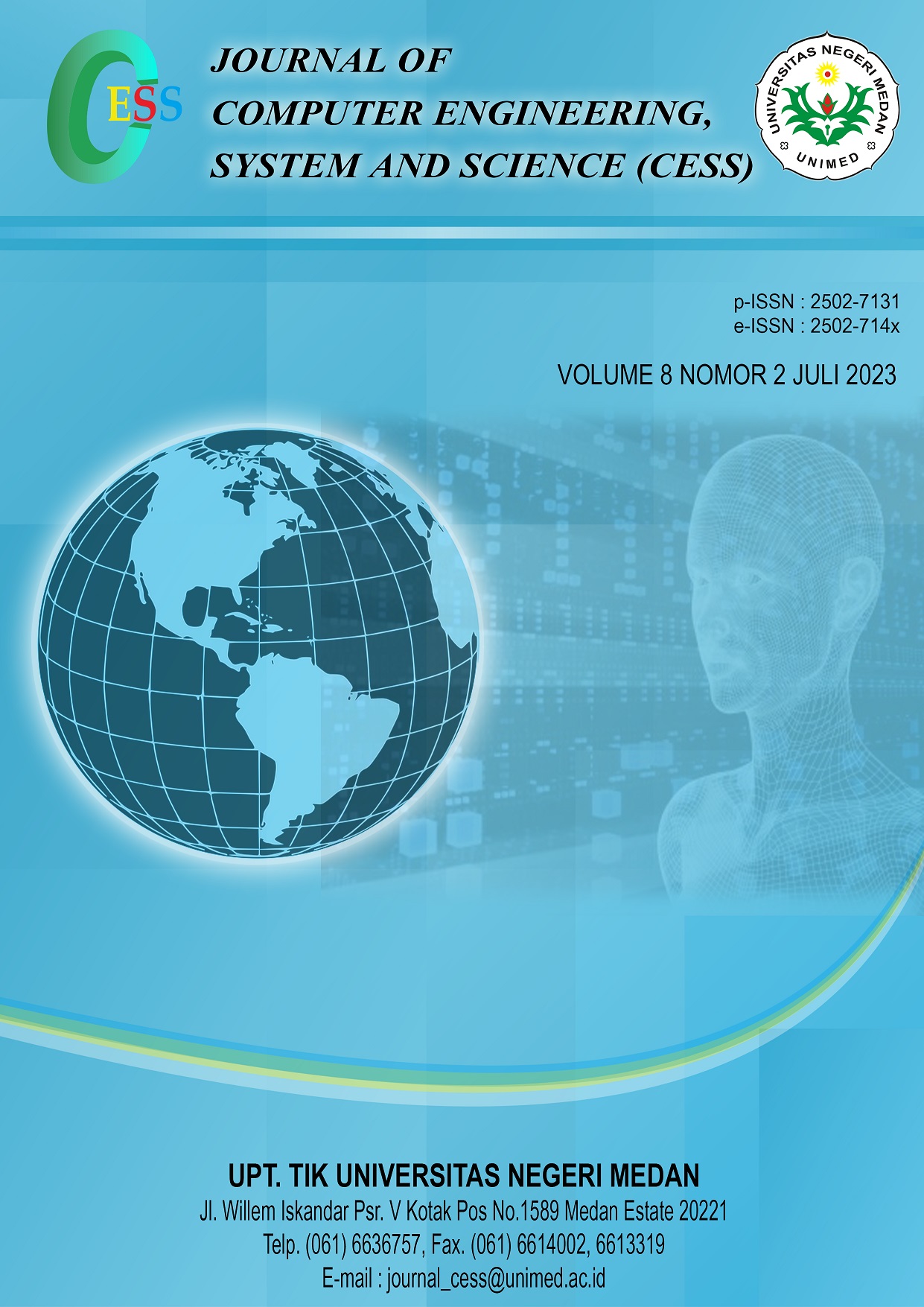Performance Comparison Analysis of Multi Prime RSA and Multi Power RSA
DOI:
https://doi.org/10.24114/cess.v8i2.47350Keywords:
Cryptography, RSA, Encryption, DecryptionAbstract
Saat ini cukup banyak algoritma yang digunakan untuk pengamanan informasi dalam sistem atau perangkat lunak. Masing-masing algoritma tersebut memiliki tingkat waktu dalam key generate, enrkripsi dan dekripsi yang berbeda-beda. Dalam menggunakan algoritma tersebut harus mempertimbangkan waktu jika ingin menerapkan dalam suatu sistem atau perangkat lunak. Dalam penelitian ini, akan melakukan perbandingan kinerja dari dua algoritma asimetris yaitu Multi Power RSA dan Multi Prime RSA yang masing-masing merupakan varian dari RSA. Algoritma ini terdiri dari 2 kunci yaitu kunci publik dan kunci privat. Pengujian algoritma tersebut akan dilakukan dalam bahasa python. Kesimpulan yang didapat adalah algoritma Multi Prime RSA lebih cepat di bandingkan dengan Multi Power RSA dalam proses enkripsi dan dekripsi. Multi Power RSA lebih cepat dari Multi Prime RSA dalam proses key generate.Currently, quite a lot of algorithms are used to secure information in systems or software. Each of these algorithms has a different level of speed (time) in key generation, encryption and decryption. In using the algorithm must consider speed (time) if you want to implement it in a system or software. In this study, we will compare the performance of two asymmetric algorithms, namely Multi Power RSA and Multi Prime RSA, each of which is a variant of RSA. This algorithm consists of 2 keys, namely the public key and the private key. Testing the algorithm will be carried out in Python. The conclusion obtained is that the Multi Prime RSA algorithm is faster than the Multi Power RSA in the encryption and decryption process. Multi Power RSA is faster than Multi Prime RSA in the key generation process.References
M. G. Kamardan, N. Aminudin, N. Che-Him, S. Sufahani, K. Khalid, and R. Roslan, œModified Multi Prime RSA Cryptosystem, J. Phys. Conf. Ser., vol. 995, no. 1, 2018, doi: 10.1088/1742-6596/995/1/012030.
A. A. Emmanuel, O. A. E, A. M. O, and A. E. O, œA Note on Time and Space Complexity of RSA and ElGamal Cryptographic Algorithms, Int. J. Adv. Comput. Sci. Appl., vol. 12, no. 7, pp. 143“147, 2021, doi: 10.14569/IJACSA.2021.0120716.
D. Z. K. Nibir, S. Nasrin, and S. M. S. Rana, œA Variant of the RSA Cryptosystem with Smaller Keys, Dhaka Univ. J. Sci., vol. 70, no. 2, pp. 15“17, 2022, doi: 10.3329/dujs.v70i2.62600.
S. Gueron and N. Drucker, œCryptosystems with a multi prime composite modulus, CCNC 2018 - 2018 15th IEEE Annu. Consum. Commun. Netw. Conf., vol. 2018-January, no. 5, pp. 1“7, 2018, doi: 10.1109/CCNC.2018.8319159.
U. Erdiansyah, M. K. M. Nasution, and Sawaluddin, œHybrid cryptosystem multi-power RSA with N=PmQ and VMPC, IOP Conf. Ser. Mater. Sci. Eng., vol. 725, no. 1, 2020, doi: 10.1088/1757-899X/725/1/012129.
J. Felisha, œAnalisis Perbandingan Algoritma RSA dengan ElGamal pada Tanda Tangan Digital, 2022.
F. P. Johari, D. Murni, and H. Syarifuddin, œModifikasi Algoritma Kriptografi RSA Multiprima Menggunakan Chinese Remainder Theorem dan Garner ™ s Algorithm, UNP J. Math., vol. 2, no. 2, pp. 36“41, 2019, [Online]. Available: http://ejournal.unp.ac.id/students/index.php/mat/article/view/6311
Downloads
Published
Issue
Section
License
Copyright (c) 2023 CESS (Journal of Computer Engineering, System and Science)

This work is licensed under a Creative Commons Attribution 4.0 International License.










